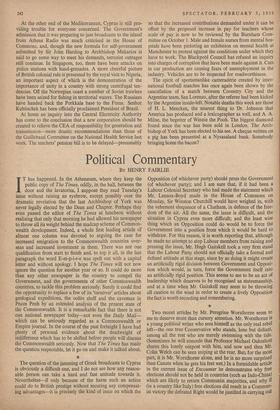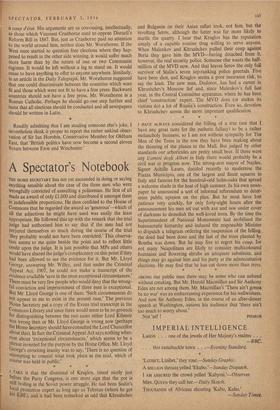Political Commentary
BY HENRY FAIRLIE IT has happened. In the Atheneum, where they keep the public copy of The Times, oddly, in the hall, between the door and the lavatories, I suppose they read Tuesday's issue without raising an eyebrow, except possibly over the dramatic revelation that the last Archbishop of York was never legally elected by the Dean and Chapter. Perhaps they even passed the editor of The Times at luncheon without realising that only that morning.he had allowed his newspaper to throw all its weight behind the madcap scheme of Common- wealth development. Indeed, a whole first leading article of almost one column was devoted to arguing the case for increased emigration to the Commonwealth countries over- seas and increased investment in them. There was not one qualification from start to finish and, to top it all, in the last paragraph the word E-m-p-i-r-e was spelt out with a capital letter and without apology. I hope The Tunes will not now ignore the question for another year or so. It could do more than any other newspaper in the country to compel the Government, and the governments of other Commonwealth countries, to tackle this problem seriously. Surely it could find the opportunity to replace a few of its 'turnover' articles about geological expeditions, the oolite shelf and the caveman in Pnom Penh by an extended analysis of the present state of the Commonwealth. It is a remarkable fact that there is not one national newspaper today—not even the Daily Mail— which can be seriously regarded as a Commonwealth or Empire journal. In the course of the past fortnight I have had plenty of personal evidence about the deadweight of indifference which has to be shifted before people will discuss the Commonwealth seriously. Now that The Times has made the question respectable, let it go on and make it talked about.
* The question of the jamming of Greek broadcasts to Cyprus is obviously a difficult one, and I do not see how any reason- able person can take a hard and fast attitude towards it. Nevertheless—if only because of the harm such an action could do to British prestige without securing any compensat- ing advantages—it is precisely the kind of issue on which the Opposition (of whichever party) should press the Government (of whichever party); and I am sure that, if it had been a Labour Colonial Secretary who had made the statement which Mr. Lennox-Boyd made in the House of Commons on Monday, Sir Winston Churchill would have weighed in, with the vehement eloquence of a Chatham, in defence of the free- dom of the air. All the same, the issue is difficult, and the situation in Cyprus even more difficult; and the least wise thing which an Opposition could do would be to force the Government into a position from which it would be hard to withdraw. For this reason, it is worth reporting that, although he made no attempt to stop Labour members from raising and pressing the issue, Mr. Hugh Gaitskell took a very firm stand that the Labour Party should not officially take a formal and defined attitude at this stage, since by so doing it might create an artificially rigid division between Government and Opposi- tion which would, in turn, force the Government itself into an artificially rigid position. This seems to me to be an act of leadership which deserves to be recognised as statesmanship. and at a time when Mr. Gaitskell may seem to be throwing, all caution to the wind in order to create a lively Opposition the fact is worth recording and remembering.
Two recent articles by Mr. Peregrine Worsthorne seem to me to deserve more than cursory attention. Mr. Worsthorne is a young political writer who sees himself as the only real rebel left—the one true Conservative who stands, lone but defiant, among all the rest who are merely swimming with the tide. (Sometimes he will concede that Professor Michael Oakeshott shares this lonely outpost with him, and now and then Mr. Colin Welch can be seen sniping at the rear. But, for the most part, it is Mr. Worsthorne alone, and he is no more surprised than Canute when he gets his feet wet.) In a formidable article in the current issue of Encounter he demonstrates why free elections should not be held in countries (such as Indo-China) which are likely to return Communist majorities, and why if (in a country like Italy) free elections did result in a Commun- ist victory the defeated Right would be justified in carrying out a coup d'etat. His arguments are as convincing, intellectually, as those which Viscount Cranborne used to oppose Disraeli's Reform Bill in 1867. But, just as Cranborne paid no attention to the world around him, neither does Mr. Worsthorne. If the West once started to question free elections where they hap- pened to result in the other side winning, it would suffer much more harm than by the return of one or two Communist regimes. It would be left without a leg to stand on. It would cease to have anything to offer to anyone anywhere. Similarly, in an article in the Daily Telegraph, Mr. Worsthorne suggested that one could discriminate between the countries which were fit and those which were not fit to have a free press. Backward countries should not have a free press. Mr. Worsthorne is a Roman Catholic. Perhaps he should go one step further and insist that all elections should be conducted and all newspapers should be written in Latin.
Readily admitting that I am stealing someone else's joke, I nevertheless think it proper to report the rather unkind obser- vation of Sir Ian Horobin, Conservative Member for Oldham East, that 'British politics have now become a second eleven fixture between Eton and Winchester.'



































 Previous page
Previous page